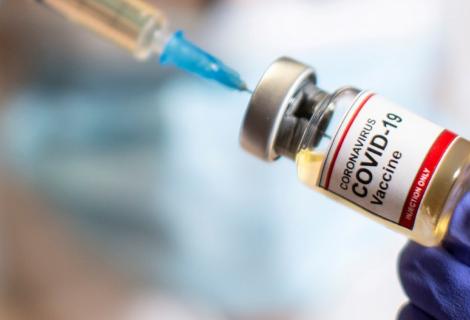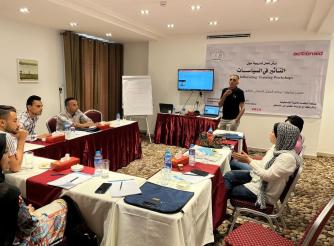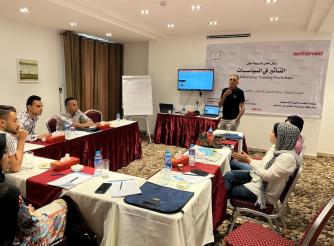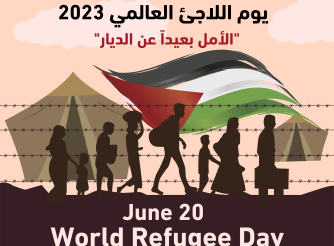Joint letter: Free and Equitable access and distribution of COVID-19 vaccine in oPt

As humanitarian organizations working in the occupied Palestinian territory we write to ask you to ensure free and equitable access and distribution of the Covid-19 vaccine to Palestinians through fulfilment of legal responsibilities by the Government of Israel, the Palestinian authorities and third states.
The Palestinian health system has been undermined to such an extent that it lacks the necessary financial or material resources to independently sustain an effective Covid-19 response. Gaza’s health system, in particular, is on the brink of collapse. Over 53 years of Israeli military occupation of Palestinian territory (oPt), including Israel’s prohibitive land closure and blockade of the Gaza Strip, severing the coastal enclave from the West Bank, have all helped produce the Palestinian health system’s current ailing condition.
In the oPt, more than 2,100 people1 have already died as a result of the outbreak of the Covid-19 pandemic. Gaza accounts for 28 per cent of all active cases, followed in the West Bank by the Hebron governorate (15 per cent) and East Jerusalem governorate (11.4 per cent). Health workers have been badly affected, with an estimated 4,000 infected, affecting the health system’s ability to sustain care. Meanwhile, the humanitarian impact is compounded by worsening poverty, food insecurity and the significant diversion of resources from other essential services.
Despite Israel’s leading global position in per-capita vaccinations, 4.5 million Palestinians in the West Bank and Gaza are denied access to Covid-19 vaccinations. Over 44 per cent of Israel’s population (4.07 million individuals) have received a first dose of the vaccine and a further 29 per cent (2.67 million individuals) have completed a second dose.2 Israelis residing in settlements – erected in the West Bank contrary to the fundamental rules of international humanitarian law – have been afforded access to vaccines, unlike adjacent Palestinian communities that are under the Israeli military’s direct control.
Article 56 of the Fourth Geneva Convention specifically confers on an occupying power the duty of ensuring “the adoption and application of the prophylactic and preventive measures necessary to combat the spread of contagious diseases and epidemics”. Moreover, it must do so “to the fullest extent of the means available to it” and “in cooperation of national and local authorities”. Per its obligations under international humanitarian law (IHL) and international human rights law (IHRL), Israel must also respect, protect and fulfil the right to health of the population in the oPt without discrimination.
These obligations were recently affirmed by the UN Special Rapporteur on the situation of human rights in the Palestinian Territory occupied since 1967, Michael Lynk, and the UN Special Rapporteur on the right to physical and mental health, Tlaleng Mofokeng. The Special Rapporteurs noted that in accordance with Article 47 of the Fourth Geneva Convention, the Oslo Accords do not absolve Israel of its international law obligations, stressing that “[t]he ultimate responsibility for health services remains with the occupying power until the occupation has fully and finally ended.”1 While some limited efforts have been made to provide vaccines to the PA, Israel has refused to publicly acknowledge its legal duties in relation to the prevention and mitigation of Covid-19 in the oPt.
The Government of Israel has transferred 2,000 coronavirus vaccines to the Palestinian Authority (PA) and made commitments to transfer another 3,000 soon. This would be insufficient in terms of even covering priority needs, and certainly does not come close to resolving the Covid-19 crisis, ensuring recovery in the oPt or fulfilling Israel’s obligations under IHL as primary duty bearer as an occupying power.
The PA will receive support through the Gavi COVAX AMC Facility for an allocation of Covid-19 vaccines to cover 20 per cent of the oPt population through in-kind donation, initially targeting priority groups such as frontline workers, the elderly, and those with underlying health conditions. Financial constraints, needs for ‘cold chain’ storage, among other shortages, also present large challenges, particularly in Gaza. This week, Israel halted the first shipment of 2,000 vaccines, which was scheduled to arrive in the Gaza Strip, intended for frontline medical workers.2 The Israeli authorities approved the transfer two days later, but this arbitrary delay is a stark example of Israel’s ‘separation policy’, physically isolating Gaza from the rest of the oPt and thereby causing a fragmented health system.
“[when we get vaccinated] It is possible that we would return to in-person classes, which is better than distance learning. Life would return to what it was in the past, and we’d be able see our friends again and learn from our teachers better.” Zein*, 16, from Nablus
A safe, effective, and universal Covid-19 vaccine is a public health necessity, an economic priority to ensure recovery, and a moral imperative for all people everywhere. It is also a prerequisite for the return to a normal education process in schools for Palestinian children, many of whom do not have access to virtual learning. Distribution of life-saving vaccines must be in conformity with international law, normative obligations and guided by the advice of public health professionals – rather than political considerations. International obligations regarding Palestinians’ right to health must be upheld, including freedom of movement of patients and healthcare personnel and bringing an end to continuing attacks on Palestinian health facilities. The Palestinian health system must be supported to meet the demands imposed by the pandemic, but chronic shortages remain in Personal Protective Equipment (PPE), drugs, disposables, infection control supplies, ICU equipment and respiratory devices and oxygen generation capacity for Covid-19 patients.
A situation where Israelis can access a vaccine but not Palestinians living under Israel’s actual control is inherently discriminatory. Without rapid action, health inequalities between Israelis and Palestinians will worsen, and the humanitarian crisis in the oPt will become further entrenched.
Recommendations:
The Government of Israel must fully, immediately and publicly recognise its primary responsibility as an occupying power to guarantee that all Palestinians in the oPt access Covid-19 vaccines without discrimination, including efforts to ensure that the PA has adequate resources to provide them without delay. It must actively cooperate in facilitation of movement and access of vaccines into the oPt, incl. the Gaza Strip. It must also guarantee access to essential equipment required to store and distribute the vaccines in the oPt, as well as other related medical materials, where such supplies are inadequate. Should national authorities and Israel fail to meet the vaccination needs of the Palestinian population and offers be made to conduct public health and humanitarian relief operations to prevent the spread of Covid-19, Israel must allow and facilitate the rapid and unimpeded passage of humanitarian relief supplies, equipment, and personnel.
The Palestinian Authority should reaffirm that the constraints created by the occupation and the cost of the vaccines limit its ability to independently vaccinate Palestinians. It should publicly clarify its specific needs with respect to vaccines, and take all necessary steps, insofar as it is able, within the constraints and financial limitations created by the occupation, to implement an equitable and comprehensive vaccination programme for all people across the West Bank and Gaza. Israel and the Palestinian authorities must effectively coordinate, without any undue political considerations, to provide Covid-19 vaccines free of charge to everyone without discrimination, giving priority to those communities and individuals most in need or at risk. In view of the guidance provided by the WHO on Covid-19 vaccines, therapeutics, and diagnostics, frontline health and humanitarian personnel should be among those prioritized as they are essential to vaccinating, treating and providing continued primary health care to the population, and also are likely to come into close contact with infected individuals.
Third states, donors, and international organisations, in keeping with their duty to respect and ensure respect for the Fourth Geneva Convention, must take all necessary measures1 to ensure the Government of Israel fulfils its duties as an occupying power. They must provide effective support to the creation of an independent Palestinian health system, including the Palestinian vaccination programme. They must step up efforts to challenge major barriers to the realization of the right to health of Palestinians, including the military occupation. They must facilitate access to essential Covid-19 healthcare supplies, including vaccines. They must also use their influence to ensure that Palestinian authorities meet their obligations under international human rights law.
Sincerely,
Shane Stevenson
Country Director
Oxfam, Occupied Palestinian Territory and Israel
Caroline Ort
Country Director
Norwegian Refugee Council
Ibrahim Ibraigheth
Country Director ActionAid Palestine
Occupied Palestinian Territory
Dr Aimee Shalan
Chief Executive Officer
Medical Aid for Palestinians
Jason Lee
Country Director
Save the Children, Occupied Palestinian Territory


